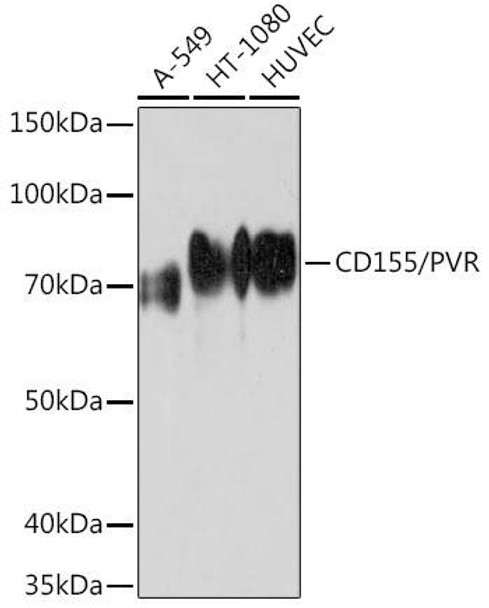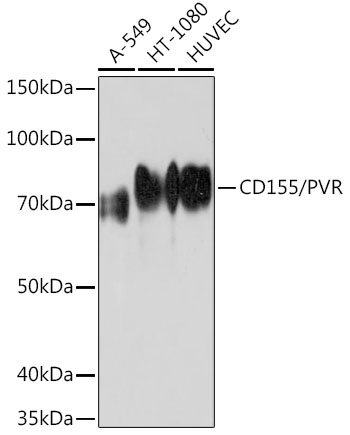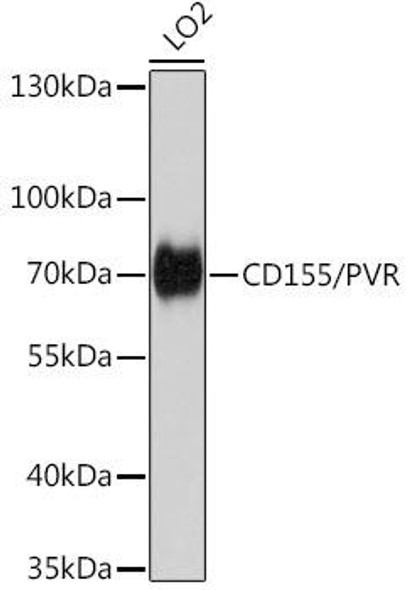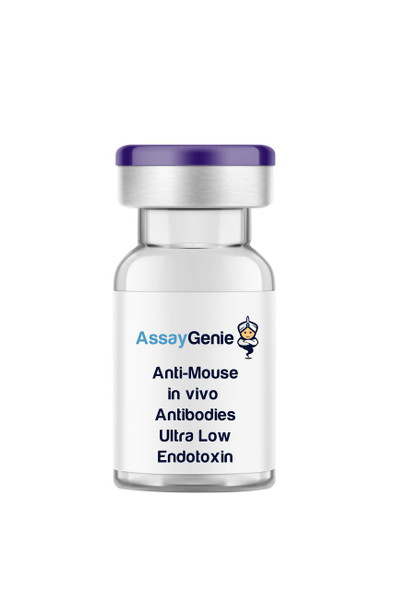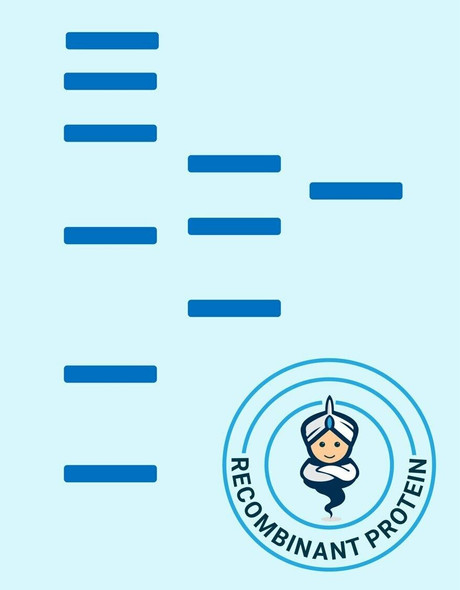Anti-CD155/PVR Antibody (CAB5138)
- SKU:
- CAB5138
- Product type:
- Antibody
- Reactivity:
- Human
- Host Species:
- Rabbit
- Isotype:
- IgG
- Research Area:
- Cell Biology
Description
| Antibody Name: | Anti-CD155/PVR Antibody |
| Antibody SKU: | CAB5138 |
| Antibody Size: | 20uL, 50uL, 100uL |
| Application: | WB |
| Reactivity: | Human |
| Host Species: | Rabbit |
| Immunogen: | A synthesized peptide derived from human CD155/PVR |
| Application: | WB |
| Recommended Dilution: | WB 1:500 - 1:2000 |
| Reactivity: | Human |
| Positive Samples: | A-549, HT-1080, HUVEC |
| Immunogen: | A synthesized peptide derived from human CD155/PVR |
| Purification Method: | Affinity purification |
| Storage Buffer: | Store at -20°C. Avoid freeze / thaw cycles. Buffer: PBS with 0.02% sodium azide, 0.05% BSA, 50% glycerol, pH7.3. |
| Isotype: | IgG |
| Sequence: | Email for sequence |
| Gene ID: | 5817 |
| Uniprot: | P15151 |
| Cellular Location: | |
| Calculated MW: | 70kDa |
| Observed MW: | 70KDa |
| Synonyms: | CD155, HVED, NECL5, Necl-5, PVS, TAGE4 |
| Background: | The protein encoded by this gene is a transmembrane glycoprotein belonging to the immunoglobulin superfamily. The external domain mediates cell attachment to the extracellular matrix molecule vitronectin, while its intracellular domain interacts with the dynein light chain Tctex-1/DYNLT1. The gene is specific to the primate lineage, and serves as a cellular receptor for poliovirus in the first step of poliovirus replication. Multiple transcript variants encoding different isoforms have been found for this gene. [provided by RefSeq, Oct 2008] |
| UniProt Protein Function: | PVR: Mediates NK cell adhesion and triggers NK cell effector functions. Binds two different NK cell receptors: CD96 and CD226. These interactions accumulates at the cell-cell contact site, leading to the formation of a mature immunological synapse between NK cell and target cell. This may trigger adhesion and secretion of lytic granules and IFN-gamma and activate cytoxicity of activated NK cells. May also promote NK cell-target cell modular exchange, and PVR transfer to the NK cell. This transfer is more important in some tumor cells expressing a lot of PVR, and may trigger fratricide NK cell activation, providing tumors with a mechanism of immunoevasion. Plays a role in mediating tumor cell invasion and migration. Serves as a receptor for poliovirus attachment to target cells. May play a role in axonal transport of poliovirus, by targeting virion-PVR-containing endocytic vesicles to the microtubular network through interaction with DYNLT1. This interaction would drive the virus-containing vesicle to the axonal retrograde transport. Belongs to the nectin family. 4 isoforms of the human protein are produced by alternative splicing. |
| UniProt Protein Details: | Protein type:Membrane protein, integral; Receptor, misc.; Motility/polarity/chemotaxis; Immunoglobulin superfamily Chromosomal Location of Human Ortholog: 19q13.2 Cellular Component: extracellular space; focal adhesion; cell surface; cytoplasm; integral to membrane; plasma membrane Molecular Function:viral receptor activity; protein binding; receptor activity; cell adhesion molecule binding Biological Process: intercellular junction assembly and maintenance; entry of virus into host cell; cell-cell adhesion; cell migration; regulation of immune response; positive regulation of natural killer cell mediated cytotoxicity directed against tumor cell target; response to virus; susceptibility to natural killer cell mediated cytotoxicity; positive regulation of natural killer cell mediated cytotoxicity |
| NCBI Summary: | The protein encoded by this gene is a transmembrane glycoprotein belonging to the immunoglobulin superfamily. The external domain mediates cell attachment to the extracellular matrix molecule vitronectin, while its intracellular domain interacts with the dynein light chain Tctex-1/DYNLT1. The gene is specific to the primate lineage, and serves as a cellular receptor for poliovirus in the first step of poliovirus replication. Multiple transcript variants encoding different isoforms have been found for this gene. [provided by RefSeq, Oct 2008] |
| UniProt Code: | P15151 |
| NCBI GenInfo Identifier: | 1346922 |
| NCBI Gene ID: | 5817 |
| NCBI Accession: | P15151.2 |
| UniProt Secondary Accession: | P15151,P15152, Q15267, Q15268, Q96BJ1, B4DTS9, |
| UniProt Related Accession: | P15151 |
| Molecular Weight: | Observed MW: 70kDaCalculated MW: 39kDa/40kDa/42kDa/45kDa |
| NCBI Full Name: | Poliovirus receptor |
| NCBI Synonym Full Names: | poliovirus receptor |
| NCBI Official Symbol: | PVR |
| NCBI Official Synonym Symbols: | PVS; HVED; CD155; NECL5; TAGE4; Necl-5 |
| NCBI Protein Information: | poliovirus receptor; nectin-like protein 5 |
| UniProt Protein Name: | Poliovirus receptor |
| UniProt Synonym Protein Names: | Nectin-like protein 5; NECL-5; CD_antigen: CD155 |
| Protein Family: | Poliovirus receptor |
| UniProt Gene Name: | PVR |
| UniProt Entry Name: | PVR_HUMAN |

